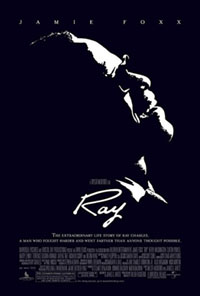 RAY
RAY(PG-13)
**** (out of 5)
October 29, 2004
STARRING
Jamie Foxx as RAY CHARLES
Kerry Washington as DELLA BEA ROBINSON
Regina King as MARGIE HENDRICKS
Clifton Powell as JEFF BROWN
Harry Lennix as JOE ADAMS
Bokeem Woodbine as FATHEAD NEWMAN
Directed by: Taylor Hackford
BY KEVIN CARR
Listen to Kevin’s radio review…
Is it just me, or am I the only one who can’t get Jamie Foxx’s character Bunz from “Booty Call” out of my head. No matter what Foxx does, no matter how good of an actor he is. No matter what part he plays, I just can’t shake the image of Bunz trying to get his booty call from Vivica A. Fox.
But in “Ray,” he manages to sweep that image under the rug. Who can talk about “Ray” without giving huge kudos to Jamie Foxx for his portrayal of music legend Ray Charles. I’ve actually known Foxx was a good actor for a while, and I really noticed him come out of his shell with a scene-stealing performance in “Collateral” earlier this year.
But in “Ray,” he turns in a phenomenal performance. And it’s more than just the Eddie Murphy SNL schtick of putting on sunglasses, smiling and swinging his head around like Stevie Wonder. Jamie Foxx became Ray Charles for this movie.
In fact, there is only one single scene that took me out of the moment, and that was a dream sequence in which Ray takes off his glasses and can see. The second he opened his eyes, I was slammed back into reality by seeing Jamie Foxx.
And that was really the biggest beef I had with this film – the dream sequences. I hate dream sequences in movies. They are almost always useless fluff used to cheat through some form of lame character development or other cinematic technique. In “Ray,” they are used to tell Ray Charles’ back story as he grew up in poverty in Florida and lost his sight from glaucoma when he was seven.
Most of these sequences actually take the form of flashbacks, which aren’t bad themselves. The real problem is that these flashback sequences sometimes leak into Ray’s real life, a la “The Dead Zone.” Unfortunately, when this happens, it’s too contrived and really seems forced.
I was born in the early 1970s, so the Ray Charles I knew and grew up with was not who was featured in this movie. “Ray” shows Charles’ early music career through the 1960s. By the time I was old enough to know who Ray Charles was, he had been through his biggest struggles, including a sour bout with heroin addiction. It was an interesting perspective to have, considering I never knew him as anything but who he was post 1970.
Of course, the last 35 years of his life are all but skipped, which probably wasn’t a bad idea since the movie clocks in with a running time pushing three hours. But the filmmakers chose to focus on his early years, which are usually the most interesting in the development of an artist. One of the most respectable aspects of this film is that the filmmakers did not shy away from Ray Charles’ checkered past. They didn’t glorify it, either. (Although they did leave out some things, like an early wife and other womanizing, and that’s okay because I think even Wilt Chamberlain might have found the number of women Charles’ bedded in his life a bit much.)
Ray Charles is thrown up on the screen with all his faults intact. He was not always the nicest man, and he didn’t always make the best choices, but this bio-pic isn’t about Ray Charles’ moral highlights. It was about his revolutionary development of his own music, and how he took control of his own destiny.
Podcast: Play in new window | Download
